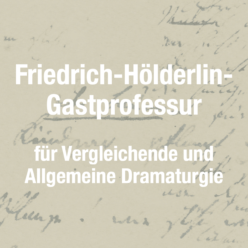Seminar in englischer Sprache / for english description see below
Die Tradition des Al-Halqa – des arabischen Erzähltheaters, das auf einer Versammlung im Kreis basiert – wurde in Marokko stark beeinflusst von den rapiden Veränderungen, die sich im Land seit der Kolonialherrschaft ereigneten. Ihre Neuerfindung im Rahmen mancher zeitgenössischer marokkanischen Theaterpraktiken ist beispielhaft dafür, dass die Bereiche von Alt und Neu nicht länger getrennt sind und das eine in das andere übergeht. Im Seminar soll untersucht werden, wie das Theater und das Erzählen (storytelling) in Marokko verschmelzen, um neue theatrale Formen aus alten zu gestalten.
Die Übertragung der alten Al-Halqa-Techniken mit ihrer kreisförmigen Anordnung in moderne Theatergebäude verdeutlicht den Geist dieses Austauschs, der das gegenwärtige marokkanische Theater bestimmt. Als ein Beispiel kann die Wandlung von Tayeb Saddikis Sidi Abder-rahman Al-Majdoub aus dem Jahr 1968 zu Naima Zitans Dialy (2012) and Arrabouz (2013/2014) diene, die eine fortwährende Obsession mit der Al-Halqa-Tradition als eine tief verwurzelte Performance-Prägung in Marokko enthüllt. Um einen Teil dieser umfassenden Entwicklungen nachvollziehen zu können, bringt dieses Seminar ‚andere‘ Stimmen und Körper in die Theaterwissenschaft ein. Das marokkanische Theater wird auf diese Weise charakterisiert durch eine grundsätzliche Tendenz, unterschiedliche Performance-Traditionen aus dem Orient und Okzident zu vereinbaren. Um zu diesen Einsichten gelangen zu können, werden StudentInnen die notwendigen Mittel näher gebracht, um das marokkanische Theater in Bezug auf den sozialen Wandel verstehen zu können.
Seminarziele:
- Das Seminar untersucht Al-Halqa Performances als Kunstpraktiken und als Mittel zum Verständnis von historischen, sozialen und kulturellen Praktiken in Marokko sowie im weiteren Sinne auch der arabischen Welt.
- Die multidisziplinäre Ausrichtung des Seminars zielt darauf ab, den studentischen Blick auf die Aufführungspraxis sowohl im alltäglichen Leben als auch in den darstellenden Künsten neu zu beleben.
Al-halqa tradition in Morocco has been deeply affected by the rapid changes taking place ever since the colonial enterprise. However, its re-invention in some contemporary Moroccan theatre practices exemplifies that territories are no longer bounded entities with the overflow of old ways into new ones. The course explores how theatre and storytelling in Morocco converge to re-invent new theatrical forms out of old ones. The very transposition of al-halqa’s techniques and circular morphology into a stage building articulates the spirit of exchange that conditions Moroccan theatre today. The journey from Tayeb Saddiki’s Sidi Abder-rahman Al-Majdoub in 1968 to Naima Zitan’s Dialy in 2012 and Arrabouz in 2013-4 reveals an ever-lasting obsession with al-halqa as a deeply rooted performance behavior in Morocco. To trace some of these wide-ranging developments, the seminar brings to light ‘other’ voices and bodies of inquiry into theatre studies. Moroccan theatre, then, becomes characterized by a general tendency toward mediating different performing traditions that belong to the Orient and the Occident. To reach this end, students will be given the appropriate tools to comprehend Moroccan performances in relation to social change.
Course Objectives:
- The course investigates Al-halqa performance as artistic practice and as a means of understanding historical, social, and cultural practices in Morocco, and by extension the Arab World.
- The course multidisciplinary perspective aims at revitalising the students’ view of performance practice both in everyday life and in the Performing Arts.
Termine: Di. 14-16 h – an folgenden Tagen:
- 24.10., 14-16 h (erstes Sitzung)
- 5.12., 14-16 h
- 12.12., 14-16 h
- 19.12., 14-16 h
- 9.01., 14-16 h
- 16.01., 14-16 h
- 23.01., 14-16 h
- 30.01., 14-16 h
- 6.02., 14-16 h
- + Block-Veranstaltungen am
- Do. 26.10., 16-20 +
- Do. 11.01., 16-20 Uhr +
- Do. 8.02., 16-20 Uhr
Possible Preparatory Readings:
- Amine, Khalid. “Crossing Borders: Al-halqa Performance in Morocco from the Open Space to the Theatre Building” TDR 45: 2 (summer 2001), pp. 55-69.
- “Performing Postcoloniality in the Moroccan scene: Emerging Sites of Hybridity”, in Contesting Performance: global sites of research, Jon Mackenzie, Heike Roms and C. J. W. L. Wee (eds) (Palgrave, 2010), pp. 191-206.
- Marvin Carlson, The Theatres of Morocco, Algeria and Tunisia: Performance Traditions of the Maghreb. London: Palgrave Series: Studies in International Performance, 2012. Benaziza, Lahsen. Romancing Scheherazade: John Barth and The One Thousand and One Nights. Maroc: Publication de la Faculté des Lettres et des Sciences Humaines, 2001.
- Carlson, Marvin (ed.). The Arab Oedipus. New York: Martin E. Segal Theatre Center Publications, 2005.
- Hamilton, Richard. The Last Storytellers: Tales from the Heart of Morocco. 2011. London: I. B. Tauris.
